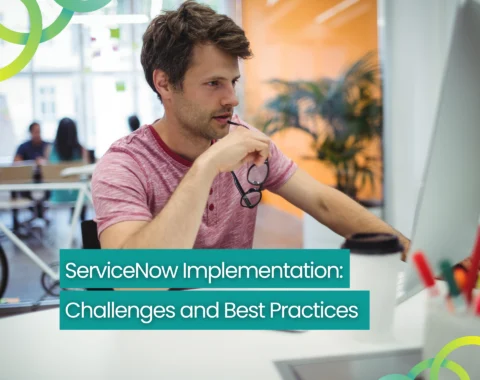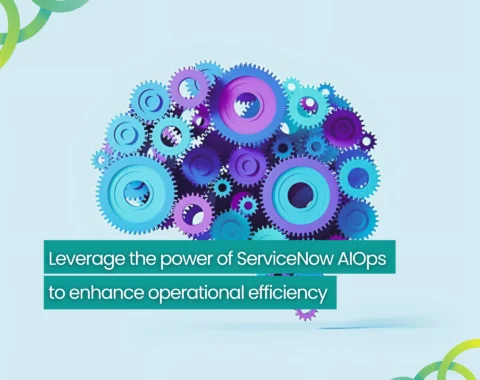How ServiceNow’s robust features drive efficiency and innovation. Uncover insights on different ServiceNow’s modules capabilities for enhanced productivity and groundbreaking solutions in our exploration of unlocking efficiency and innovation.

ServiceNow at a Glance
In today’s fast-paced business landscape, staying ahead of the competition requires not only streamlined processes but also innovation at its core. ServiceNow, a powerful platform for digital transformation, has emerged as a game-changer in this regard. With its myriad features and capabilities, ServiceNow empowers organizations to deliver exceptional services, enhance productivity, and foster innovation. In this blog, we will delve into the world of ServiceNow features, exploring how they drive efficiency, collaboration, and continuous improvement across various industries.
ServiceNow is a cloud-based platform that offers a wide range of services for managing business operations, including IT service management (ITSM), customer service management (CSM), human resources service delivery, and more. It leverages automation, artificial intelligence, and other cutting-edge technologies to streamline workflows and improve the overall user experience.
Following are the Core ServiceNow Features
ServiceNow boasts a comprehensive set of features that cater to various aspects of organizational operations. Let’s break down some of the core features and their significance
-
Incident Management
Incident management is one of the foundational features of ServiceNow. It allows organizations to efficiently identify, track, and resolve incidents or service disruptions. This feature ensures that any operational hiccups are addressed promptly, minimizing downtime and disruptions.
-
Change Management
Change management is critical for organizations looking to implement updates, upgrades, or changes to their systems and services. ServiceNow's change management feature enables organizations to plan, execute, and monitor changes effectively, reducing risks and ensuring smooth transitions.
-
Service Catalog
The service catalog feature allows organizations to create a centralized list of services available to employees and customers. It streamlines the request process, making it easy for users to request and access the services they need.
-
Self-Service Portals
Self-service portals are designed to empower users to find answers to common questions and request assistance without the need for direct human interaction. ServiceNow's self-service portals enhance the user experience by providing a convenient and efficient way to access information and services.
-
Asset Management
Asset management is crucial for maintaining an inventory of hardware and software assets, optimizing asset usage, and reducing costs. ServiceNow offers robust asset management features that help organizations track and manage their assets effectively.
-
Knowledge Management
Knowledge management is a cornerstone of successful customer service and IT support. ServiceNow's knowledge management feature helps organizations capture, manage, and share knowledge across the enterprise, making it easier for employees and customers to find the information they need.
-
Reporting and Analytics
ServiceNow's reporting and analytics capabilities provide organizations with valuable insights into their operations. Users can create customized reports and dashboards to monitor key performance indicators, make data-driven decisions, and continuously improve their services.
-
Integration and Automation
ServiceNow is renowned for its powerful integration capabilities. It can seamlessly connect with a wide range of third-party applications and systems, enabling organizations to create end-to-end automated workflows. This feature plays a pivotal role in reducing manual, repetitive tasks and enhancing overall efficiency.

IT Service Management (ITSM) Features
While ServiceNow offers a diverse set of features for various business functions, it’s especially renowned for its IT Service Management capabilities. Here are some of the notable features in this domain
IT Service Desk
The IT service desk is the first point of contact for IT-related issues. ServiceNow’s IT service desk feature empowers organizations to efficiently manage service requests, incidents, and problem resolution, all while providing a seamless experience for users.
Service Level Management
Service level management is essential for setting, monitoring, and meeting service level agreements (SLAs). ServiceNow’s service level management feature allows organizations to define, measure, and report on SLAs, ensuring that service commitments are consistently met.
IT Operations Management
ServiceNow’s IT Operations Management feature helps organizations monitor and manage their IT infrastructure proactively. It provides real-time visibility into the health and performance of IT services, ensuring that issues are detected and addressed before they impact users.
IT Asset Management
IT asset management is an integral part of ITSM. ServiceNow’s IT asset management feature helps organizations optimize asset utilization, control costs, and maintain compliance with software licenses and hardware warranties.
Customer Service Management (CSM) Features
In addition to ITSM, ServiceNow offers robust customer service management features to enhance customer experiences. Here are some of the key CSM features
Case Management
Case management is the cornerstone of CSM. ServiceNow’s case management feature enables organizations to track, manage, and resolve customer inquiries and issues efficiently, ensuring a high level of customer satisfaction.
Customer Self-Service
Just as in ITSM, self-service portals play a pivotal role in CSM. ServiceNow’s customer self-service feature empowers customers to find solutions to their problems and request assistance on their own terms, reducing the burden on support teams.
Field Service Management
For organizations with on-site service needs, ServiceNow’s field service management feature is a game-changer. It optimizes field service operations, from scheduling and dispatching to tracking and reporting, leading to improved efficiency and customer satisfaction.
Employee Service Management (ESM) Features
ServiceNow goes beyond ITSM and CSM, offering Employee Service Management features to streamline HR and workplace operations
HR Service Delivery
HR service delivery is essential for managing employee requests, onboarding, and HR processes. ServiceNow’s HR service delivery feature automates HR tasks and provides employees with self-service options for a better HR experience.
Facilities Service Management
Facilities service management is vital for maintaining a productive workplace. ServiceNow’s facilities service management feature streamlines facilities requests, maintenance, and space management, ensuring a comfortable and efficient work environment.
Innovation with ServiceNow Features
ServiceNow is not just about managing day-to-day operations but also fostering innovation within organizations. Here’s how ServiceNow features contribute to innovation
Automation and Workflow
ServiceNow’s automation capabilities enable organizations to design and implement workflows that can automate routine tasks and processes. This frees up human resources to focus on more strategic and innovative initiatives. ServiceNow harnesses the power of artificial intelligence (AI) and machine learning (ML) to provide predictive insights and recommendations. For example, AI-powered chatbots can enhance customer support, while ML algorithms can optimize IT operations.
App Development
ServiceNow’s low-code and no-code app development capabilities empower organizations to create custom applications and solutions tailored to their unique needs. This flexibility fosters innovation by allowing organizations to build tools and processes that give them a competitive edge.
Integration Hub
The Integration Hub in ServiceNow allows organizations to connect various systems and data sources, creating a seamless flow of information. This integration capability enables innovation by providing a unified view of data and processes.
ServiceNow in Action: Real-World Examples
To better illustrate the impact of ServiceNow features, let’s explore a few real-world examples
Healthcare Industry
In the healthcare industry, ServiceNow is used for IT service management and patient service management. It helps healthcare providers streamline IT operations, manage patient records securely, and improve the patient experience. For instance, patient self-service portals allow patients to schedule appointments, access test results, and communicate with their healthcare providers.
Retail Sector
Retail companies utilize ServiceNow for their customer service management, including case management and customer self-service. ServiceNow’s ability to integrate with e-commerce platforms and customer databases enables personalized customer support, enhances shopping experiences, and drives customer loyalty.
Financial Services
Financial institutions leverage ServiceNow for incident management, change management, and customer service management. This ensures that critical financial systems are always available and that customers receive timely support. Automated workflows reduce operational risks and improve customer satisfaction.
Education Institutions
In the education sector, ServiceNow is employed for IT service management and employee service management. It helps educational institutions manage their IT infrastructure and streamline HR processes. Students and staff benefit from self-service portals for IT support, class registrations, and HR inquiries.
Challenges and Considerations
While ServiceNow offers a plethora of benefits, organizations should also be aware of certain challenges and considerations
Implementation Costs
Implementing ServiceNow can involve initial setup costs and ongoing licensing fees. Organizations Should assess budget and return expectations.
Customization Complexity
ServiceNow’s flexibility can lead to complex configurations. Organizations should plan their customization carefully to avoid overcomplicating their workflows.
Security and Compliance
ServiceNow manages sensitive data, so security and compliance are critical. Organizations must adhere to best practices and industry regulations to protect their data.
Conclusion
In a world driven by digital transformation, ServiceNow stands out as a versatile and powerful platform that offers a multitude of features to enhance operational efficiency, improve customer experiences, and foster innovation. Its core features, including incident management, change management, service catalog, self-service portals, asset management, and knowledge management, cater to a wide range of organizational needs.
For IT service management (ITSM), ServiceNow provides IT service desk, IT operations management, service level management, and IT asset management features. For customer service management (CSM), it offers case management, customer self-service, and field service management. Additionally, Employee Service Management (ESM) features address HR service delivery and facilities service management needs.
As organizations increasingly look to embrace automation, AI, and innovation, ServiceNow is well-positioned to help them achieve their goals. By integrating and automating workflows, harnessing AI and machine learning, fostering integration, and offering app development capabilities, ServiceNow opens doors to endless possibilities for streamlining operations and driving innovation.
While ServiceNow brings numerous advantages, it’s essential for organizations to consider implementation costs, user adoption, customization complexity, and security and compliance requirements. By carefully navigating these challenges, organizations can maximize the benefits of ServiceNow and position themselves for success in a rapidly evolving business landscape.
In summary, ServiceNow is not just a software platform; it’s a catalyst for transformation. It empowers organizations to evolve, adapt, and thrive in a dynamic world by leveraging its powerful features to drive efficiency and innovation across various industries.
Our Clients
































































